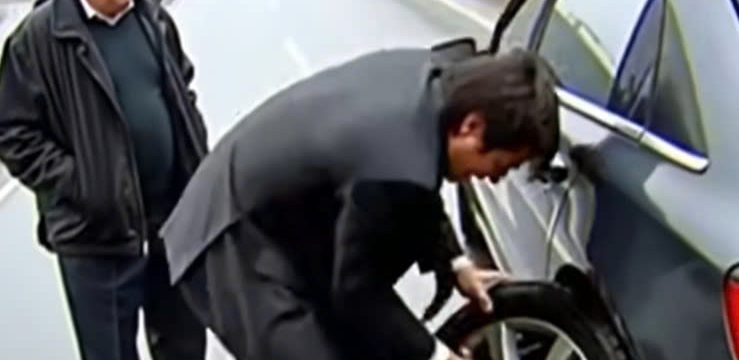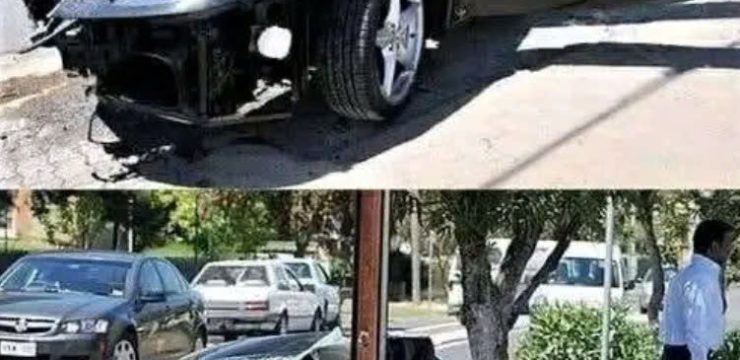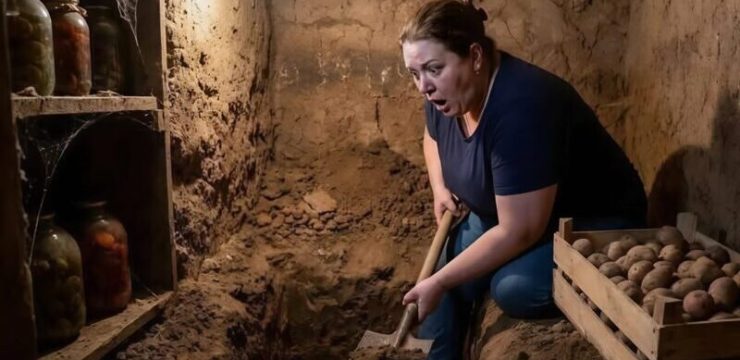The morning had started like any other, with the classroom buzzing the second the bell rang. Backpacks lay half-open on desks, pencils clattered across tabletops, and conversations bounced loudly from one corner of the room to the other. The teacher, more amused than bothered, leaned against her desk with a small laugh as she halfheartedly attempted to calm everyone down. The energy felt alive, but not the warm, joyful kind that usually fills a classroom. Something sharper lingered beneath the noise—something directed at a single child sitting quietly in the middle row.

John hadn’t spoken a word since he walked in. His shoulders were hunched, his eyes fixed on the corner of his textbook, as though he could make himself invisible if he just stayed small enough. Every whisper, every snicker, every poorly hidden jab seemed to push him further into himself. One student pointed at him, laughing under their breath, completely unaware of how deeply those small acts of cruelty cut into someone already struggling to hold himself together.
John’s hands tightened around the sides of his desk. His breathing quickened, his vision blurred, and he blinked rapidly, desperate to keep the tears from spilling over. He wanted nothing more than to disappear—just vanish from the noise, the stares, and the embarrassment he never deserved.
Then everything shifted.
The classroom door opened—not loudly, not dramatically, but with a calm confidence that instantly changed the atmosphere. Conversations stopped mid-sentence. Chairs froze. Even the teacher straightened her posture, her expression quickly turning serious as she looked toward the doorway.
A tall man stood there—steady, composed, someone who didn’t need to raise his voice to command attention. He wasn’t dressed like someone wealthy or powerful. He wore a simple shirt, a worn jacket, and sturdy shoes that suggested hands accustomed to building rather than pointing. But there was something unmistakably strong about him, something that made every student sit up just a little straighter.
He stepped into the room slowly, deliberately, as though taking the time to absorb everything around him. John looked up from his desk, his breath catching in his throat the second he recognized the man standing in the doorway.
A soft, reassuring smile spread across the man’s face—warm enough to melt every ounce of fear weighing on John’s shoulders. Then, with a gentle yet firm tone, he addressed the class.
“Hello, everyone. My name is Mr. Thomson… and I am John’s father.”
The room erupted into a collective gasp. Even the teacher’s eyebrows shot up, clearly caught off guard by his unexpected entrance. For the first time all morning, every student was silent—not because they were told to be, but because something inside them urged them to listen.
Mr. Thomson walked toward the front of the class with calm assurance. “I understand,” he said thoughtfully, “that my son went through a difficult moment today.” He didn’t scold or yell. His tone was steady, and that steadiness carried more weight than raised voices ever could.
The teacher shifted awkwardly. A few students swallowed hard.
“But before we go any further,” he continued, “I want to share something with all of you.”
He paused—not for dramatic effect, but as if choosing his words with genuine care.
“You see, I don’t have what many people consider a normal job. I’m not a lawyer. I’m not a doctor. I don’t sit behind an office desk. I don’t wear a suit. And because of that, people sometimes make assumptions about me—and sometimes, those assumptions reach my son.”
John lifted his head just a little.
“What I am,” Mr. Thomson said, his smile widening, “is an inventor.”
Whispers immediately spread across the room.
“A real inventor?”
“Does he make machines?”
“Does he build robots?”
The teacher opened her mouth to restore order, but a single calm glance from Mr. Thomson settled the class instantly.
“Yes,” he said, “a real inventor. I build things the world doesn’t have yet—things that take imagination, trial and error, and a lot of passion. And John has helped me for years. He’s not just a kid watching from the sidelines. He’s my partner.”
John’s eyes widened, pride rippling through him in a way no one in that room had ever seen.
“We’re working on something important,” his father continued. “A device that turns polluted air into clean oxygen. It’s still being developed, but imagine what that could mean for cities filled with smog, for people with breathing problems, and for our planet as a whole.”
The room fell silent in awe. Even the teacher’s earlier enthusiasm had faded into something closer to shame. She looked down, no longer amused by the teasing she had brushed aside.
“Every family is different,” Mr. Thomson said softly. “Every path is different. But no child deserves to be mocked because of assumptions others make. You may not understand someone’s life from the outside. But kindness—kindness is something each of us can choose.”
He looked at John, giving him a small nod filled with pride.
John straightened fully, no longer shrinking, no longer hiding. He looked stronger—strong enough to meet the eyes of the classmates who had laughed just minutes before.
Before leaving, Mr. Thomson turned one last time. “Kindness is not weakness. It is strength. And being curious about someone’s life is far better than judging them.”
Then he stepped out quietly.
For a long moment, no one moved. Then slowly, every head turned toward John—not with ridicule, but with curiosity, admiration, and newfound respect.
From that day forward, everything changed. The teasing stopped. The laughter softened. Conversations grew kinder. And John walked through school not as a boy trying to hide, but as someone who understood his worth—and helped others understand theirs, too.
Because sometimes, it only takes one moment…
one voice…
one truth…
to change a child’s world.





